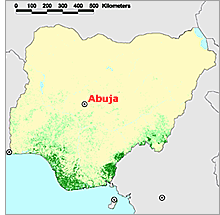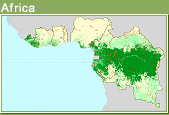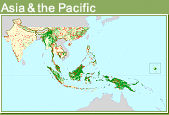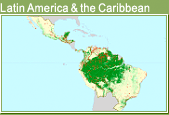Country details
Status of Tropical Forest Management 2005
Africa
Nigeria

©UNEP-WCMC 2004
There are several obstacles to SFM in Nigeria. These include the discretionary power of government to de-reserve or harvest the forests; the lack of a coherent forest policy; the prevalence of illegal logging and harvesting of NWFPs in most of the high-forest states; chronic under-resourcing of forestry programs and forest management; overlapping responsibilities among federal, state and local governments and excessive bureaucracy; the lack of inter-sectoral coordination; and the overall absence of reliable data on which to base forestry planning and development. Nigeria has a long history of forest management and the formal goal is to achieve self-sufficiency in all aspects of forest production; however, the country, once a significant exporter, is now a net importer of primary forest products and considerable work must be done to achieve this goal.
Key points
- Nigeria has an estimated PFE of 4.11 million hectares, comprising 2.72 million hectares of natural production forest, 1.01 million hectares of protection forest and 375,000 hectares of planted forest. The PFE covers less than 5% of Nigeria's total land area.
- Data are generally weak and the federal government cannot confirm the accuracy of the data presented herein.
- A forest reserve system was created in 1937 covering 9.7 million hectares (10% of the land area), but much of this is no longer forested.
- The goal of the 1988 forest policy is to expand the forest estate from 10% to 20%, but this has not occurred.
- Insufficient information was available to estimate the area of PFE under SFM.
- The forestry sector is administered at the federal, state and local government levels according to the Nigerian constitution. However, there is a lack of clarity in the mandates of the three levels.
- The main concerns of the federal government are to provide an adequate policy framework for the states and to support afforestation and conservation programs.
- State governments are solely responsible for the management of forest resources and the coordination of forest development activities with local communities.
- Forest production has fallen, creating an imbalance between supply and demand. From its previous status as a significant exporter of forest products, Nigeria has become a net importer.
- The wood-processing industry is characterized by outdated technology, poor recovery and inefficiency.
- A National Forestry Development Program designed to encourage community plantation development is in place.
- A proportion of revenues from timber should go to local communal landowners but, in practice, funds are often diverted, reducing the incentive for local people to protect forests.

 Africa
Africa  Asia & the Pacific
Asia & the Pacific  Latin America & the Caribbean
Latin America & the Caribbean